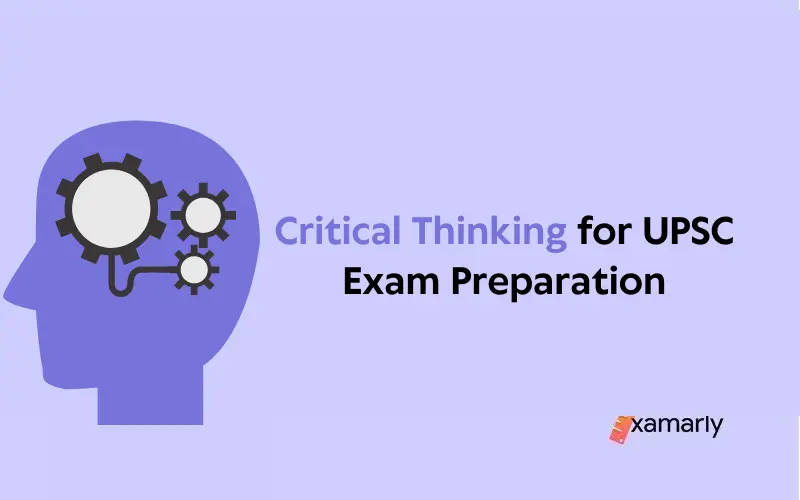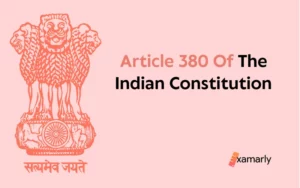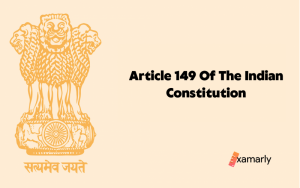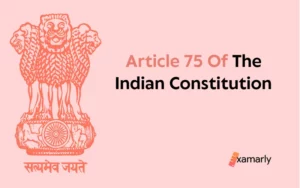Do you want to know why critical thinking for UPSC exam preparation is essential? The formation of an impartial judgment through the objective examination and assessment of a problem or scenario is known as critical thinking.
This type of quality can be inculcated with time. This life skill is not only needed in writing answers in UPSC Mains and Personality tests or any other competitive exams but is also required in your profession as a civil servant officer.
Analysis or evaluation, open-mindedness, problem-solving skill, interpretation, and inference are the key elements of critical thinking.
This article not only leads you to develop critical thinking for UPSC exam preparation but also enables you to write an original answer easily in UPSC Mains. Why? Because many aspirants face the issue of how to write answers with ease, or how to articulate their thoughts to write an original piece to fetch good marks among the pile of answer sheets in UPSC Mains.
- What is UPSC Exam Format?
- Why is Critical Thinking For UPSC Exam Preparation an Important Skill?
- Where Should You Use Your Critical Thinking for UPSC Exam Preparation?
- 7 Methods to Develop Analytical Skills for Critical Thinking for UPSC Exams
- 1. Dig Out the Answers
- 2. Counter Your Views
- 3. Analyze and Research the Available Information
- 4. Simultaneously Think Divergently and Convergently
- 5. Interact With Different Groups
- 6. Make Your Inference
- 7. Be Curious While Reading Books
- Closing Thoughts
- Frequently Asked Questions
- What is critical thinking and why is it important for UPSC exam preparation?
- What are some ways to enhance my critical thinking abilities in preparation towards the UPSC exam?
- How does critical thinking help in UPSC exam preparation?
- What is the role of critical thinking in the UPSC exam?
- How can I use critical thinking to prepare for the UPSC exam?
- Can critical thinking help me crack the UPSC exam?
- Is critical thinking necessary for UPSC exam preparation?
- How important is critical thinking for UPSC exam preparation?
- What steps can I take to cultivate critical thinking abilities for UPSC exam preparation?
- How do I prepare for the critical thinking portion of the UPSC exam?
What is UPSC Exam Format?
| Stage | Description | Duration | Marks |
|---|---|---|---|
| Stage 1 | Civil Services (Preliminary) Exam | 1 Day | 400 |
| Objective-type multiple-choice questions | |||
| Two papers: General Studies Paper 1 & General Studies Paper 2 | |||
| Stage 2 | Civil Services (Main) Exam | 5 Days | 1750 |
| Written examination consisting of 9 papers | |||
| 2 qualifying papers: Indian Language & English | |||
| 7 papers on various subjects including Essays, General Studies, Optional Subject | |||
| Stage 3 | Personal Interview | 30-45 Minutes | 275 |
Why is Critical Thinking For UPSC Exam Preparation an Important Skill?
Critical thinking for UPSC preparation is one of the important elements that is expected from the aspiring candidates of UPSC who want to be a future allied civil servant.UPSC is one of the prestigious exams in India and critical thinking plays an important role.
To solve the nation’s problems, logical reasoning skills and judgmental skills are required as this will enable you to have a look at the pros and cons of any solution/idea before applying it. (i.e. to look at every nook of the problem and its possible solution and then apply it for the benefit of our people).
UPSC does not put your round knowledge to the test but in fact, it puts the ability to test one’s decision-making skills. Alternatively, it tests whether you can think multifaceted to any issues or problems of society like observational skills or pattern analysis skills and are capable enough to solve them efficiently in the required time frame.
Also Read: UPSC Exam Pattern
Where Should You Use Your Critical Thinking for UPSC Exam Preparation?
You should use your critical thinking skills throughout the UPSC process, starting from the preliminary stage till the interview stage. Here are a few examples of where critical thinking can be applied in the UPSC:
- Civil Services (Preliminary): When answering multiple-choice questions, critical thinking can help you evaluate the credibility of the options, identify biases, and make informed decisions.
- Civil Services (Main) In the written examination, you will be required to analyze complex issues, form independent judgments, and present your opinions clearly and coherently.
- Personal Interview: During the personal interview, you will be asked questions on various topics ranging from current affairs to your area of expertise. this ability can help you evaluate the credibility of information, analyze arguments, and make informed decisions, which will be evaluated by the interview panel.
Overall, critical thinking is a crucial skill that is tested in various stages of the UPSC and is essential for success in the exam.
7 Methods to Develop Analytical Skills for Critical Thinking for UPSC Exams
One of the winning factors that can make you stand out from the crowd and can crown you is the ability to think critically in Civil Services Exam.
The points listed below that will not only help you to develop critical thinking for UPSC preparation but also improve one’s decision-making skills to give you an edge on your UPSC.
1. Dig Out the Answers
The first methodology to develop critical thinking for UPSC exam preparation is to dig out the answer. Instead of believing or accepting everything as it is, try to reason behind any fact or belief.
Try to answer basic questions about anything before accepting it will help your brain to evolve and figure out the reason behind anything which enables it to frame an opinion in accordance or will help you to come up with the solution.
The more you practice digging out the answers to indirect questions, the more you exercise your brain to evolve and will help you to structure an effective judgment after going through every nook.
Similar Post: Time Management for UPSC Preparation: 9 Effective Tips
2. Counter Your Views
Take debatable topics one by one and have a debate with yourself. In general, countering your views will enable you to be unbiased towards any issue or tricky situation. This will help you to develop a strong point of view and argue it with others, thereby helping you to develop critical thinking for UPSC preparation.
Be critical of your reasoning! This is one of the most important aspects of developing the skills of critical thinking for UPSC exam preparation.
Being critical of your reasoning helps you to analyze why something is true or false. The more you reason critically, the more effective you become at solving problems and making decisions.
3. Analyze and Research the Available Information
First of all, analyze and check the available information and dig out to research more to expand your knowledge of concepts or information to have a 360-degree understanding.
Reverse Thinking or Think like an outsider: Studies show that the most effective way to solve a problem is to flip it over or think about it in reverse.
Try to look at things from different angles and perspectives; this will help you become more adept at analyzing any given situation independently without being influenced by others’ beliefs and values.
Analyze situations before taking any decision: Decision-making is an essential skill when it comes to UPSC Exam because there are many tricky questions asked from time to time that needs proper analysis before taking any decision!
Analyzing means considering all possible factors before making any decision; whether positive or negative! So, analyze every situation before taking any decision.
Also Read: IAS Full Form: A Comprehensive Outlook
4. Simultaneously Think Divergently and Convergently
Both thinking methods go hand in hand simultaneously, enabling you to be a critical thinker.
Divergent thinking enables you to find out every possible outcome of an issue. Use convergent thinking to scale down the solution and single out the most suitable one.
5. Interact With Different Groups
Another important method to develop critical thinking for UPSC exam preparation is to interact with people of different cultures, age groups, etc. to acknowledge their perspectives. Since everyone are different in one way or another, their thinking is also diversified and they have their viewpoint on different topics.
This will enable you to look at the situation from their view angle and hence enable you to avoid partisanship notions or resist bias.
Henceforth, push yourself to be the one who respects others’ viewpoints while having their own and can be unbiased towards any situation.
6. Make Your Inference
Acknowledge others’ outlooks or viewpoints towards any current issue but try to make your inference. In short, avoid being satisfied with others’ conclusions on any piece of information or news trend.
Instead, think of yourself and put your input into it. This will aid you in thinking analytically and also helps you to develop critical thinking for UPSC exam preparation.
7. Be Curious While Reading Books
It is very important to be curious while reading books as this will help you to get more information about a particular subject or topic.
Curiosity leads to learning new things, which eventually helps us in developing our skills of critical thinking for UPSC exam preparation and decision-making abilities.
You should focus on reading books that are based on facts rather than fiction because it will increase your curiosity level and make you question everything around you!
Related Post: Books Written By IAS Officers
Closing Thoughts
Imagination is more important than knowledge.
Einstein
Einstein noted that knowledge gained from different sources will enable you to answer the questions and your thoughts will revolve around it unless you give colours to your thought process.
Imagination or innovative thinking will expand your mind to think beyond the reading knowledge.
Thus critical thinking for UPSC exam preparation not only helps you in clearing UPSC CSE Exams but also will help you at every stage of your life.
Frequently Asked Questions
What is critical thinking and why is it important for UPSC exam preparation?
Critical thinking is a mental process of objectively analyzing information and forming an independent judgment. It is important for UPSC exam preparation as it helps to evaluate the credibility of information, identify biases, and make informed decisions.
What are some ways to enhance my critical thinking abilities in preparation towards the UPSC exam?
To improve your critical thinking skills for the UPSC exam, you can practice evaluating information and arguments, engage in discussions with others, and read diverse perspectives on a variety of topics.
How does critical thinking help in UPSC exam preparation?
Critical thinking helps in UPSC exam preparation by enabling you to evaluate the relevance of information, make informed decisions, and understand the implications of your choices.
What is the role of critical thinking in the UPSC exam?
The role of critical thinking in the UPSC exam is to enable you to analyze information and form independent judgments, thereby demonstrating your ability to think critically and make informed decisions.
How can I use critical thinking to prepare for the UPSC exam?
You can use critical thinking to prepare for the UPSC exam by evaluating information and arguments, reading diverse perspectives, and engaging in discussions with others to broaden your understanding of different topics.
Can critical thinking help me crack the UPSC exam?
Yes, critical thinking can help you crack the UPSC exam by enabling you to analyze information, evaluate arguments, and make informed decisions, which are essential skills for success in the exam.
Is critical thinking necessary for UPSC exam preparation?
Yes, critical thinking is necessary for UPSC exam preparation as it helps you to evaluate information, form independent judgments, and demonstrate your ability to think critically and make informed decisions.
How important is critical thinking for UPSC exam preparation?
Critical thinking is highly important for UPSC exam preparation as it enables you to evaluate information and form independent judgments, which are essential skills for success in the exam.
What steps can I take to cultivate critical thinking abilities for UPSC exam preparation?
You can develop critical thinking skills for the UPSC exam by practising evaluating information and arguments, engaging in discussions with others, and reading diverse perspectives on a variety of topics.
How do I prepare for the critical thinking portion of the UPSC exam?
To prepare for the critical thinking portion of the UPSC exam, you can practice evaluating information and arguments, engage in discussions with others, and read diverse perspectives on a variety of topics.






